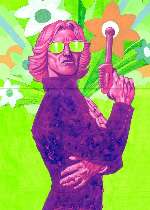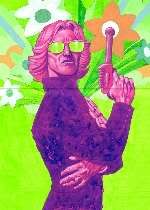Yay, back to back (using the term loosely) posts on roughly the same topic!!! Do I know how to alienate my (mostly imaginary) readership or WHAT?! But, you see, I'm still hung up on HBO's The Wire and the more I think about it the more I like it.
For me the thing which makes the show works is something which I hinted at in my last post, namely that The Wire does characterization better than almost every other work of TV or Film that I can think of. ALL the characters are real and believable, the 'Plot' happens as a result of the characters rather than the characters being used to make the plot work. The result of this is a show which has far more in common with naturalistic film movements like Dogma or French new wave than other examples of of the Police Drama sub-genre.
Films like Gummo and The 400 Blows redefined the focus of film by emphasizing Character above all. Both used improvisation which I don't believe is an element in The Wire, but the idea that PLOT is the result of (and far less important than) the actions of people is essential in all three.
People are people and what motivates them is as different from person to person as it is from moment to moment. In a entertainment universe where it's still rare to get moral shades of gray it's simply staggering to see a show which doesn't moralize at ALL. Bad things happen to be sure, but they are all the logical result of the collective actions of all the players of the game. Each one plays their part to the best of their ability, each choice passed through the moral and empirical values of each character.
What, to me, is most amazing is that all of this takes place within one of the most plot driven of all genres: Police Fiction. Not that there isn't a strong tradition of character driven police fiction, rather that those characters tend to be fairly flat archetypes brought into the mix merely to accomplish the requisite action down the line. In The Wire it is the character's three-dimensionality rather than their blunt flatness which makes the action work, driving the plot.
Cases get assigned on the basis of political back-biting, the personal becomes political, the political becomes the financial... all working together to create a baroque web of inter connectivity. They say 'Shit Happens' and it's true, it does. And when you're living in the shit it's often hard to see why it happened... if you could only view it from the outside you might be able to see the lines and make the connections. Dogma tried to make film relevant again by shifting the focus to naturalism and the individual... The Wire makes the Police Drama relevant again by doing the same thing.
Friday, October 20, 2006
Thursday, October 12, 2006
"Smart" TV
Aaron Sorken has a new show, on Studio 60 on the Sunset Strip Sorken uses the same hyper-literate dialogue which he has been known for from Sports Night or The West Wing. Like those shows Studio 60 is a close look at a work environment, this time a late-night sketch comedy show. In addition to commenting on the media and culture the show also comments metatextuality on its creators and its own place in the Network Television firmament. It also tosses off (not so) casual nods to everything from 17th century Italian comedy to the 24hour news cycle. In a recent essay on Slate.com Troy Patterson correctly states: "Half the point of watching a show like it is to feel smart while talking about it—to reach around and pat oneself on the back for being in on its in-jokes, knowledgeable about its knowingness, and alert to its Preston Sturges-quality banter."
Critics also point to this quality complaining either that the dialogue is "smart sounding for the sake of sounding smart" or that all the 'characters' are just different aspects of the same voice (namely Sorken's.) I think that there is a validity to these criticisms as well as something laudable in the pointedly smart elitist banter.
I was kind of thinking about this lately, off and on... and then I started watching The Wire. The Wire is a profoundly complicated HBO drama also about the workplace, in this case the workplaces looked at are the Baltimore Police department and a Crack/Heroin operation running out of a public housing project.
Adam Smith said "Show me, Don't tell me" and I think that one sentence is the biggest difference between Studio 60 and The Wire. Sorken TELLS us EVERYTHING, it's all laid out in fairly stark terms... in the first show the new Network boss Jordan (played by Amanda Peet) clearly and unambiguously allies herself with THE ARTIST rather than THE SUITS, the schism is profound and absolute, there are only two sides of which only one is right, by meeting with show creator Judd Hersh rather than holding up with the panicking executives she instantly defines herself and the environment in which all the characters exist. Contrast this with a scene in The Wire where the investigative team has been ordered to arrest low level dealers so that the higher ups can close the case and placate the political interests which got the investigation started in the first place. The investigative team is comprised mostly of cast-offs from various departments given to the team because they are unwanted within their own divisions. The two oldest members of the team are the least well liked, both middle-aged and often drunk their only interest is in doing the minimal amount of work and getting the most possible overtime pay. During the arrest one of them (drunkenly) grabs at a suspect who then sucker-punches him. The head Narcotics officer on the scene, Kima Griggs, who has no love for either of her drunken compatriots is on the offender in a heartbeat, and proceeds to royally kick his ass. What is being said here? On the most base level, like the Studio 60 scene, our female protagonist is declaring her loyalty and defining the sides of the conflict. But whereas the landscape in Studio 60 is a simple Art Vs. Commerce duality and the scene helps clarify the landscape and the players; the scene is The Wire is confusing. Despite the Cops Vs Robbers plot, most of the fighting we've seen in The Wire is intramural. Kima HATES her drunk co-worker and probably loved to see him get hit in the face, but she still feels the need to defend him because if nothing else he is a cop, and "you don't hit a cop." The Studio 60 scene is reductive, and puts several (new) characters in conveniently labeled boxes, the Wire scene is expansive, showing us again that loyalty and relationships are hopelessly complex.
Consistently, The Wire never tells, it always shows... Watching Studio 60 tells you about the way Aaron Sorken sees the world, not entirely without merit, but The Wire shows you the world. I like Studio 60, but it's 'Smart" TV for elitists, The Wire is Smart TV.
Critics also point to this quality complaining either that the dialogue is "smart sounding for the sake of sounding smart" or that all the 'characters' are just different aspects of the same voice (namely Sorken's.) I think that there is a validity to these criticisms as well as something laudable in the pointedly smart elitist banter.
I was kind of thinking about this lately, off and on... and then I started watching The Wire. The Wire is a profoundly complicated HBO drama also about the workplace, in this case the workplaces looked at are the Baltimore Police department and a Crack/Heroin operation running out of a public housing project.
Adam Smith said "Show me, Don't tell me" and I think that one sentence is the biggest difference between Studio 60 and The Wire. Sorken TELLS us EVERYTHING, it's all laid out in fairly stark terms... in the first show the new Network boss Jordan (played by Amanda Peet) clearly and unambiguously allies herself with THE ARTIST rather than THE SUITS, the schism is profound and absolute, there are only two sides of which only one is right, by meeting with show creator Judd Hersh rather than holding up with the panicking executives she instantly defines herself and the environment in which all the characters exist. Contrast this with a scene in The Wire where the investigative team has been ordered to arrest low level dealers so that the higher ups can close the case and placate the political interests which got the investigation started in the first place. The investigative team is comprised mostly of cast-offs from various departments given to the team because they are unwanted within their own divisions. The two oldest members of the team are the least well liked, both middle-aged and often drunk their only interest is in doing the minimal amount of work and getting the most possible overtime pay. During the arrest one of them (drunkenly) grabs at a suspect who then sucker-punches him. The head Narcotics officer on the scene, Kima Griggs, who has no love for either of her drunken compatriots is on the offender in a heartbeat, and proceeds to royally kick his ass. What is being said here? On the most base level, like the Studio 60 scene, our female protagonist is declaring her loyalty and defining the sides of the conflict. But whereas the landscape in Studio 60 is a simple Art Vs. Commerce duality and the scene helps clarify the landscape and the players; the scene is The Wire is confusing. Despite the Cops Vs Robbers plot, most of the fighting we've seen in The Wire is intramural. Kima HATES her drunk co-worker and probably loved to see him get hit in the face, but she still feels the need to defend him because if nothing else he is a cop, and "you don't hit a cop." The Studio 60 scene is reductive, and puts several (new) characters in conveniently labeled boxes, the Wire scene is expansive, showing us again that loyalty and relationships are hopelessly complex.
Consistently, The Wire never tells, it always shows... Watching Studio 60 tells you about the way Aaron Sorken sees the world, not entirely without merit, but The Wire shows you the world. I like Studio 60, but it's 'Smart" TV for elitists, The Wire is Smart TV.
Subscribe to:
Posts (Atom)

